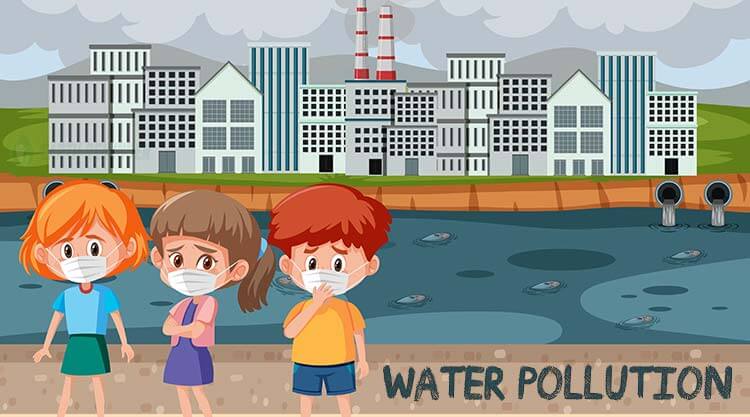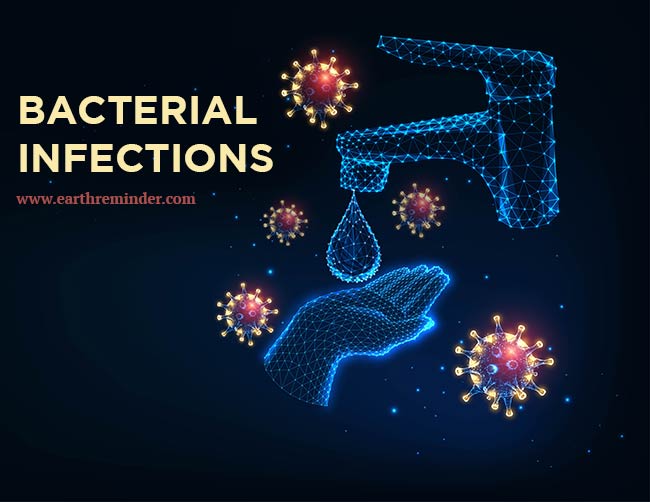Harmful Effects of Water Pollution on Human Health and Control Measures
Water Pollution and Human Health
Effects of Water Pollution on Human Health
When harmful chemicals or toxins enters the water bodies like streams, rivers, ponds, lakes, oceans, etc. it contaminates the water. The contaminants turn the water into toxic, which becomes unhealthy for the use of organisms.

There are various causes of water pollution, and surprisingly most of them are human-induced. We dump industrial waste, household waste, agricultural waste, sewage, etc. into the water bodies resulting in water pollution.
Polluted water is affecting millions of creatures living in the aquatic culture. We are also getting affected by contaminated water when we consume this water. Dirty water contains various harmful bacteria and viruses that caused many health issues in humans. Sometimes, the symptoms of these infections become quite dangerous that may lead to serious health implications.
Table of Contents
Impacts of water pollution on human health
Water pollution is a significant environmental issue. Polluted water leads to a scarcity of water in many countries. Due to the shortage, many people are forced to consume contaminated water that mostly ends up causing various diseases. Some of the harmful effects of water pollution on human health include:
Bacterial infections
Cholera
It is a bacterial disease. Polluted water is generally the medium to spread this disease. Vibrio cholera is the one who is responsible for causing this disease. Cholera leads to thousands of deaths every year due to the consumption of polluted water.
This bacterium generates toxins in the digestive tracts of the infected person. As far as cholera symptoms are concerned, the infected person usually gets very mild or no symptoms at all. However, about one in ten infected persons may experience the symptoms of cholera such as vomiting, leg cramps, and profuse watery diarrhea.
Diarrhea
Diarrhea is an underlying disease caused by water pollution. Campylobacter jejuni is mainly known for causing diarrhoea, approximately 4-15% across the world. In diarrhoea, a person may have loose, liquid, or watery bowel movements in a day with abdominal cramps. This condition may last for a couple of days and may lead to dehydration due to loss of fluid.
Even though diarrhoea is not a life-threatening disease, but an individual has to suffer from the unpleasant condition for a few days. In children, diarrhoea may be a little intense in some cases with high fever, continuous vomiting, bloody stools, etc. However, it can be cured with proper medication.
Salmonella
Salmonella is a kind of bacteria. It may cause infection when ingested within the human body through polluted water. Salmonellosis infects the intestinal tracts of a person who consumes contaminated water, having this bacterium.
An infected person may have symptoms of Salmonella fever, diarrhoea, abdominal cramps, headaches, and in some cases, vomiting & loss of appetite.
The symptoms of salmonella can be quite severe and may last for 3-4 days or a week in newborns and older people.
E.Coli
- Coli or Escherichia Coli is a common bacteria found in the intestines of a healthy person. However, the E.Coli bacteria are also associated with some harmful strains that may cause severe implications if consumed. These symptoms mostly include abdominal cramps, vomiting, diarrhoea, etc.
Botulism
It is a sporadic type of poisoning caused by a toxin named Clostridium botulism. The bacteria may cause paralysis in the infected person that starts from the face and then spreads to the limbs.
In some cases, the situation may be critical if it allows the spread and paralyzes the muscles used for breathing. In this case, the condition may lead to respiratory failure.

Typhoid
Typhoid is a fever mainly caused by consuming contaminated food or water. It is an acute illness related to fever caused by a bacterium known as Salmonella enterica serotype Typhi.
The infected person may get these symptoms of typhoid- high fever, weakness, headache, stomach-ache, loss of appetite, etc.
However, the person can overcome typhoid fever with the help of proper medication. In rare and severe cases, the condition may last for the unfortunate death of the infected person.
Dysentry
Dysentry is a disease caused by water pollution. It is inflammation of the intestines & usually leads to bloody diarrhoea.
In general, dysentery is caused by a bacterium known as Shigella. However, dysentery is also caused by some other kinds of viruses, protozoa, or parasite found in water.
When people consume this polluted water, it may cause symptoms of dysentery having diarrhoea, cramping, stomach pain, etc.
Viral infections
Hepatitis A
Hepatitis A is an extreme infection of the liver caused when people take polluted water or food. The common symptoms of this infection include stomach pain, nausea, fatigue, low appetite, jaundice, etc.
Poliomyelitis
Poliomyelitis disease is caused by a virus named Poliomyelitis. The symptoms of the disease include fever, constipation, sore throat, nausea, diarrhoea, etc. Sometimes an infected person may also develop paralysis depending on the intensity of the infection.
Hepatitis E
It is also a kind of infectious liver disease caused by a virus known as hepatitis E. This disease is mostly related to the countries that have poor sanitation practices. People who got hepatitis E infection may suffer from fatigue, jaundice, vomiting, joint pain, fever, nausea, etc.
Gastroenteritis
This is a viral disease. Different viruses are responsible for causing this disease, such as adenoviruses Norwalk virus, rotaviruses, and caliciviruses. The symptoms of gastroenteritis include headache, fever, vomiting, etc.
However, the infected person may not get immediate symptoms after infection; instead, it takes 1 or 2 days to appear. The condition may be a little dangerous in infants, young children, and disabled people.
Parasitic health issues
Polluted water not only contains harmful bacteria and viruses, but it also contains infectious parasites that may cause various health issues to humans.
Cryptosporidiosis
It is a disease caused by a parasite named cryptosporidium parvum. It is a global disease caused by water pollution that has symptoms like diarrhoea, upset stomach, loose or watery bowels, stomach cramps, etc. This parasite affects the immune system of a person resulting in vomiting & diarrhoea.
Galloping amoeba
It is caused by Entamoeba histolytica that affects the stomach lining of the ingested person. This parasite undergoes cyst or non-cyst form in water. When the cyst is present in the polluted water, and a person consumes it, then it occurs.
The symptoms of this parasitic disease include fever, chills, and watery diarrhoea, etc.
Giardiasis
It is also a parasitic infection caused by Giardia lamblia. This infection leads to injury in the cells of the intestinal lining.
The parasite is resistant to wintery temperature & disinfectant. The ingested person can get symptoms like bloating, weight loss, excessive gas, watery diarrhoea, etc.
Preventive Measures of Water Pollution
Water is a vital resource for organisms and the environment. When contaminants mix with water bodies, the water gets polluted and unhealthy for use. These are some of the useful preventive measures to control water pollution to some extent.
- Waste treatment
Waste treatment plays a vital role in preventing water pollution. The industrial sewage needs to be adequately treated before it exposed to the environment to minimize its harmful effects.
- Septic tank process
Septic tanks also help in treating water pollution by separating solids from liquids. It relies on biological processes to degrade the solids, whereas fluids flow out into a land drainage system.
- Denitrification process
Denitrification is another ecological water treatment process that converts nitrates into nitrogen gas. This process protects groundwater from contamination by preventing leaching of nitrate into the soil.
- Ozone treatment
Ozone treatment, i.e., ozone waster water treatment, is also used for treating polluted water. In this process, an ozone generator breaks down pollutants in a water source. The generators use UV radiation or an electric discharge field and convert oxygen into ozone. As ozone is reactive, so it oxidizes bacteria or any other organic pollutant present in the water source.
Well, these were some of the water treatment processes to treat polluted water. However, we should contribute to minimizing the process of water pollution by controlling our activities that are causing water pollution. Some solutions to control water pollution include:
- Air pollution is majorly responsible for contaminating water bodies. Oceans absorb almost 25% of human-induced carbon dioxide released in the atmosphere. We can avoid this by controlling our carbon emission activities like burning of fossil fuel, saving energy, farming & forestry, etc.
- Plastic has become one of the major pollutants responsible for polluting the water bodies on Earth. Our oceans are an ideal example of getting affected by plastics. It is imperative to minimize the use of plastic as it takes hundreds of years to decompose and remains as it is polluting the water.
- 3Rs will also help reduce water pollution, hence implementing 3Rs in your lifestyle to prevent water pollution.
- Be careful while using your toilet or sink to avoid unwanted scrap to throw down, such as paints, oils, or any litter. Use Eco-friendly toiletries or cleaning agents.
- Pesticides and fertilizers are also big-time responsible for water pollution. Hence, be careful while using it and avoid overuse of these products.
- You can make a small group with your friends or family members and plan a clean-up event on weekends on beaches or in river banks, ponds, lakes, etc.
- Most importantly, conserve water so that we do not have to face the scarcity of water. Hence, do not use more than you need. Save every single drop of water to sustain life on the Earth.
Effects of water pollution is increasing day by day. It one of the major environmental issues that affect all species of the Earth. The whole world is suffering from the worst scenarios of contaminated water. The primary sources of water pollution are directly linked to us. Yes! We are mainly responsible for contaminating water bodies through various activities.
As a result of this uncontrolled disposal, the water is getting polluted, spreading various bacteria, viruses, parasites, etc. Eventually, this polluted water is affecting our health, causing different diseases caused by bacteria, viruses, or parasites. Hence, we must follow the laws for water conservation and contribute to controlling water pollution to save water for us & our future generations.